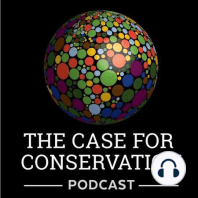7 min listen

32. When should we question environmental orthodoxy? (Russell Galt)
32. When should we question environmental orthodoxy? (Russell Galt)
ratings:
Length:
43 minutes
Released:
May 4, 2023
Format:
Podcast episode
Description
There is a tendency in societies to adhere to conventional wisdom. We resist challenges to consensus views, and may even dismiss those who do challenge them as conspiracy theorists... which they sometimes are. But perhaps we take that idea too far sometimes. Perhaps we underestimate the importance of having the freedom to challenge orthodoxy. We live in an age in which more people than ever before are lucky enough to inhabit free societies, but recently it has become “conventional” to take issue with some of these hard-earned freedoms - albeit often with good intentions. Even people who don’t follow the news cycle must be familiar with the concepts of cancel culture and de-platforming. In this episode we discuss the notion of questioning orthodoxy, with a focus on the environment and especially conservation.My guest is Russell Galt, Head of Policy and Science at Earthwatch Europe, and previously Senior Programme Coordinator of IUCN’s work on urban conservation and Young Champions of the Earth Coordinator with the United Nations Environment Programme. Russell recently complete a Master of Business Administration at the University of Edinburgh, to complement his earlier studies in ecology.Timestamps 02:39 Historical examples of heterodox thinkers06:10 False consensus in the scientific literature09:42 Well-intentioned exaggeration in conservation12:28 Thought experiment on fighting lies with lies15:18 The robustness of truth 16:23 Harnessing behavioral science17:26 Attention-grabbing figures as a means of promoting conservation24:54 Less well considered threats to life on Earth; looking at the bigger picture27:08 Nature-based solutions31:07 Romantic notions of indigenous knowledge37:30 Important of a culture of debateLinks to resourcesThe Science Delusion - Book by Rupert Sheldrake exploring the idea that science is constricted by assumptions Messaging Should Reflect the Nuanced Relationship between Land Change and Zoonotic Disease Risk - Article in BioScience on the need for nuanced science communicationPromoting health and wellbeing through urban forests – Introducing the 3-30-300 rule - IUCN website introducing Cecil Konijnendijk van den Bosch's "3-30-300" concept on urban conservationSummary for Policymakers of IPCC Special Report on Global Warming of 1.5°C approved by governments - IPCC webpage that makes reference to the loss of coral reefs under dofferent scenarios of climate changeContinued coral recovery leads to 36-year highs across two-thirds of the Great Barrier Reef - Summary of a recent survey by the Australian Institute of Marine Science AIMS report Lo—TEK - Design by Radical Indigenism - Julia Watson’s website, with explanation and links to her book on how indigenous peoples and local communities use natureVisit www.case4conservation.com
Released:
May 4, 2023
Format:
Podcast episode
Titles in the series (46)
Introduction to the case for conservation podcast (André Mader) by The case for conservation podcast